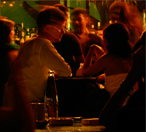 People in Bangalore seem to be living in 1984, with draconian laws disguised as moral policing that are taking away people’s civil liberties. In the late 1990s, the city had India’s most happening nightlife scene and often received the epithet of having a ‘happening pub culture’. Today, after 11:30 pm, a curfew kicks in and you can hear crickets. There are still numerous pubs and discotheques in the city, but you are only allowed to drink and sit still in your seat. A local musician, Krittika Sharma recounts, “I was in a pub and one of my favourite songs came on. I was happily swaying in my seat to the music. The security guard came up to me and actually asked me to stop!” She continues, “The music scene in this city is going to die out altogether if people do not make a stand against such prohibitive laws.”
People in Bangalore seem to be living in 1984, with draconian laws disguised as moral policing that are taking away people’s civil liberties. In the late 1990s, the city had India’s most happening nightlife scene and often received the epithet of having a ‘happening pub culture’. Today, after 11:30 pm, a curfew kicks in and you can hear crickets. There are still numerous pubs and discotheques in the city, but you are only allowed to drink and sit still in your seat. A local musician, Krittika Sharma recounts, “I was in a pub and one of my favourite songs came on. I was happily swaying in my seat to the music. The security guard came up to me and actually asked me to stop!” She continues, “The music scene in this city is going to die out altogether if people do not make a stand against such prohibitive laws.”
The Police Commissioner of Bangalore, B G Jyothiprakash Mirji, is taking the prohibition against dancing far more seriously than the law was intended for. The prohibition in Karnataka was a result of Mumbai’s dance bars being shut down. The fear was that the suddenly unemployed dancers would shift base to Bangalore. And old law from 1967 was cited: Rule 11 of the Karnataka State Excise License General Conditions Rules, which states: ‘no dancing, no get-together and no feast shall be allowed in clubs, bars and pubs’.
Live music has always been an integral part of any urban, cosmopolitan culture. However, bands are banned from playing music at pubs and bars which may attract crowds that stand around to hear them play, and god forbid, enjoy the music enough to tap their feet. A discotheque license is now required to allow dancing or live music in any pub, but it is so expensive that only five-star hotels in the city have them. The flip side is that most youth cannot afford to go to five-star hotels to listen to their favourite bands!
Stefan Kaye, a member of Delhi-based Ska band, the Ska Vengers, recounts, “My performance in Bangalore was cancelled because live music was being clamped down upon. I even offered to do the gig for free, you know, to make a stand against people’s civil liberties being taken away. But the establishment refused to take the chance!” What’s next? The police have now also taken things a few steps further. They have banned ‘loud flashy lights’ and ‘loud Western music’ from bars and pubs as well (presumably because these will brainwash people into committing crimes).
Indians are notoriously apathetic, and gathering the will to protest against such laws and lobby for change requires a collective effort. Once our civil liberties are taken away, it is an uphill challenge to regain them. And the ‘Big Brother’ syndrome will spread like cancer until we have no diversity, difference of opinion, music and art or even freedom of speech. Before the police begin to burn stacks of ‘Western’ books and attack movie theatres for showing ‘licentious’ behaviour, we need to make a stand and stop the law from ironing us into submission.
Volume 1 Issue 5


























